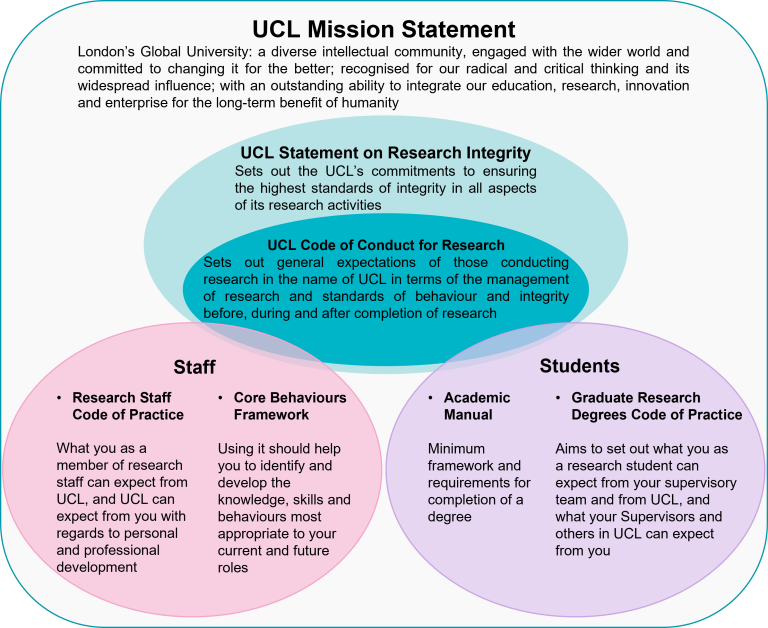Additional information and guidance to help you understand how to apply the Code and were to find further help and support.

The UCL Code of Conduct for Research sets out general expectations of those conducting research in the name of UCL in terms of the management of research and standards of behaviour and integrity before, during and after completion of research.
Click on the tabs below to find out more:
- Definitions
- Conflict of Interest - A conflict can occur when the duties owed to a party by staff or students compete with their personal interests, personal relationships or duties to others. Conflicts of interest may be financial or non-financial or both. See also the UCL Disclosure of Conflict and Declaration of Interest Policy.
- Data - As set out by UCL Research Data Policy: ‘Data are facts, observations or experiences on which an argument or theory is constructed or tested. Data may be numerical, descriptive, aural or visual. Data may be raw, abstracted or analysed, experimental or observational. Data include but are not limited to: laboratory notebooks; field notebooks; primary research data (including research data in hardcopy or in computer readable form); questionnaires; audiotapes; videotapes; models; photographs; films; test responses Research collections may include slides; artefacts; specimens; samples’
- Funder - Source of money for a particular research project
- Head of academic unit - Head of the academic unit within the university, including faculty, departments, institutes and other academic divisions
- Institution - University College London
- Principal investigator - Leader of the project, usually the main holder of the research funding. Only staff members can be principal investigators
- Research - ESRC’s Framework for Research Ethics 2015 defines research as ‘any form of disciplined inquiry that aims to contribute to a body of knowledge or theory’
- Researcher - Any person involved in research including, UCL students or staff, honorary staff, affiliate academics and visiting researchers. This definition includes anyone performing activities that support the ‘disciplined inquiry that aims to contribute to a body of knowledge or theory’ and would include technical or other professional staff directly engaged in the research activity themselves or on behalf of the academic staff
- Sponsor - Sponsor is the organization who takes responsibility for the initiation, management and financing of the study or project. This is not the same as a funder. If you are a staff member or a student member your sponsor will normally be UCL. Research can have more than one sponsor and, in such cases, it must be clear what responsibilities are being taken on by each sponsor.
- Student - Any person enrolled to study with the University, including undergraduate, postgraduate taught and postgraduate research programmes
- Supervisor - For the purpose of this code is defined as any staff member who is responsible for agreement and oversight of a student research project
- How to use this code?
Where ‘Must’ is used this indicates a mandatory requirement. Mandatory requirements in the code stem from UCL Policies or UK legislation. Failure to comply with the mandatory elements of the Code of Conduct may result in an investigation under the UCL Procedure for investigating and resolving allegations of research misconduct and/or the Disciplinary Procedure (for staff) or the Student Academic Misconduct Procedure (for students). Any legal breaches may result in legal proceedings. In addition, any investigations or breaches may need to be reported to the funder as per their requirements.
Where ‘Should’ is used, this indicates actions that normally must be taken unless you have an explicit reason not to. These, while not mandatory, are no less important; they set out UCL’s expectations of how to conduct quality research while maintaining research integrity. Failure to meet these standards may be raised by line managers or supervisors and escalated if necessary and proportionate.- How to raise concerns about the compliance with the code?
Concerns about compliance with the code can be raised in line with the specific policies and regulations. Staff are encouraged to raise their concerns with their manager, their HR Business Partner, a Dignity Advisor, trade union representative or local leadership team (e.g., Head of Academic Unit). Students are encouraged to speak to their supervisors, a Dignity Advisor, the Students Union Advice service, or the Student Mediator.
- For research integrity inquiries, contact Research Integrity team at researchintegrity@ucl.ac.uk.
- For queries related to the UCL Procedure for investigating and resolving allegations of research misconduct, contact the Executive Director of Student Services and Registrar and/or the Governance Manager: Research Integrity.
- For general enquires around EDI please contact equalities@ucl.ac.uk.
To make a report, or to seek support information around instances of bullying, harassment, or sexual misconduct, visit the Report & Support website.
- How this Code fits with other research requirements?
It is important to understand how UCL’s Code of Conduct for Research works within wider UCL context. The UCL mission statement outlines the overarching aims and values for our institution. Within these values the UCL Statement on Research Integrity highlights UCL’s commitment to ensuring the highest standards of integrity in all aspects of research actives and set out the principles of Research Integrity to guide researchers and their work.
- UCL’s Code of Conduct for Research provides more detailed guidance and expectations in terms of standards of behaviour and research management, related to conducting research activities in the name UCL.
- The Code of Conduct for Research works in synergy with other UCL codes and frameworks: for staff, these include HR policies and related guidance including Research Staff Code of Practice and Core Behaviours Framework; for students, Academic Manual and Graduate Research Degrees Code of Practice.
Roadmap of codes and requirements related to conducting research activity at UCL

- References
Following documents were referred to when preparing this Code:
- Australian Code for the Responsible Conduct of Research
- Netherlands Code of Conduct for Research Integrity
- RCUK Policy and Guidelines on Governance of Good Research Conduct
- The European Code of Conduct for Research Integrity
- UKRIO Code of Practice for Research: Promoting good practice and preventing misconduct
- University of Leicester Research Code of Conduct version 2016
- Acknowledgements
This Code was written by members of staff within the Research Integrity team. We would like to thank the Advisory Group for their contributions, help and support:
- Alison Fuller
- Andrew Cooper
- Andrew Stoker
- Andrew Wills
- Benet Salway
- Carsten Gerner-Beuerle
- Daniel Kelberman
- David Bogle
- Graham Hart
- Helene Burningham
- Ian Zachary
- Jacqueline Glass
- Jason Rihel
- Jill Norman
- Kartikeya Tripathi
- Lynn Ang
- Magdalena Morawska
- Matt Sydes
- Richard Bucknall
- Richard Mole
- Rowena Lamb
- Simon Banks
- Tony Kenyon
We would also like to thank all the individuals who responded to the UCL-wide consultation of the draft.
Please see associated policies and guidance - Quick Links
 Close
Close

